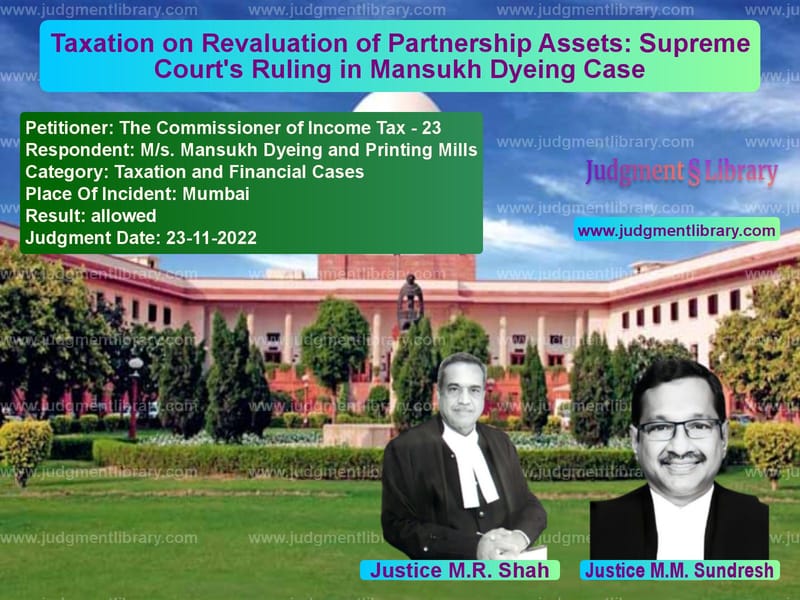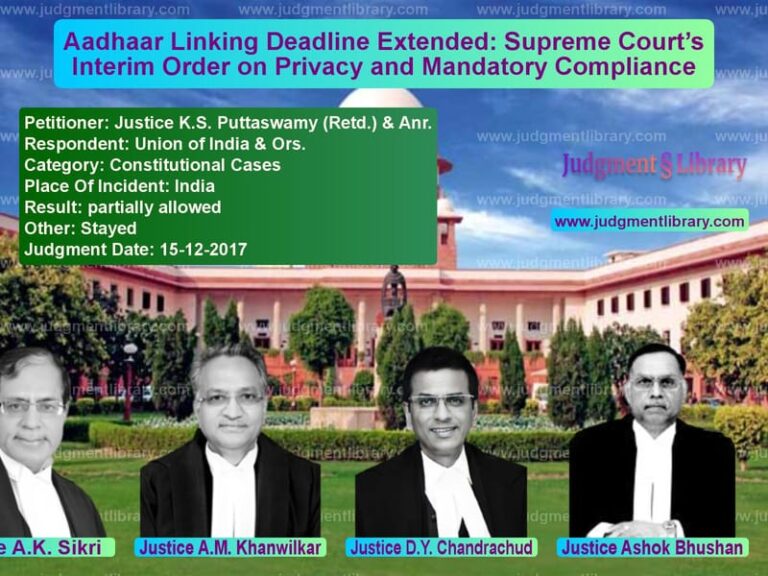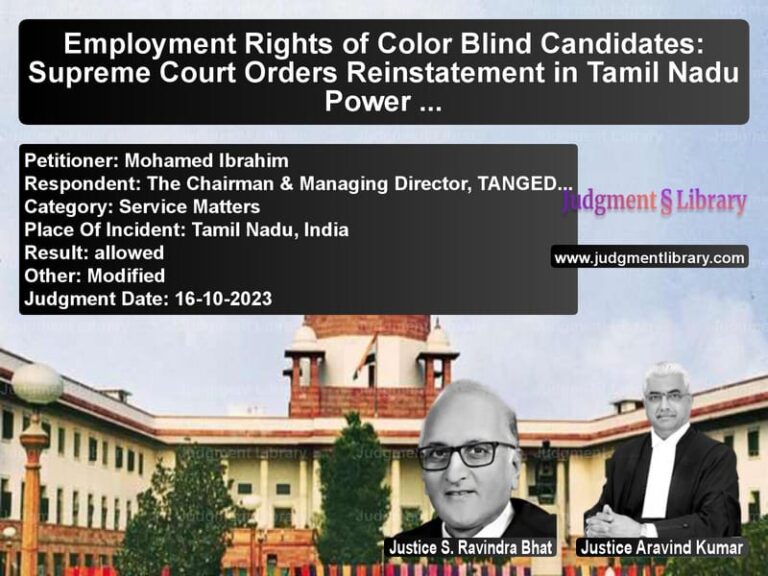Taxation on Revaluation of Partnership Assets: Supreme Court’s Ruling in Mansukh Dyeing Case
The case of The Commissioner of Income Tax – 23 vs. M/s. Mansukh Dyeing and Printing Mills revolves around the taxation of revaluation of assets in a partnership firm. The Supreme Court examined whether revaluation of partnership assets and crediting the enhanced value to partners’ capital accounts constitutes a taxable transfer under Section 45(4) of the Income Tax Act, 1961.
Background of the Case
M/s. Mansukh Dyeing and Printing Mills, a partnership firm, was originally formed by four partners. Over time, new partners were inducted, and some retired. On January 1, 1993, the firm revalued its assets, increasing their value by Rs. 17.34 crores. The revalued amount was credited to the capital accounts of the partners in their profit-sharing ratio. The Revenue assessed this as a ‘transfer’ and taxed it under Section 45(4) of the Income Tax Act, leading to a tax liability on the firm.
Key Legal Issues
The case raised critical questions:
- Does the revaluation of assets and crediting the increased value to partners’ accounts amount to a ‘transfer’ under Section 45(4)?
- Is taxation applicable even if there is no actual transfer of assets?
- What is the effect of the words ‘or otherwise’ introduced in Section 45(4)?
- Does the Supreme Court’s previous ruling in Hind Construction Ltd. (1972) apply post the amendment of Section 45(4)?
Arguments by the Revenue
The Revenue contended that:
- The revaluation and distribution of the increased value to partners’ accounts amounted to a ‘transfer’ of assets.
- Section 45(4) applies to cases where there is a distribution of capital assets, whether on dissolution or otherwise.
- The revaluation benefitted new partners who contributed a nominal amount but received a significant share in the enhanced value.
- The Bombay High Court’s decision in A.N. Naik Associates (2004) supports the argument that ‘otherwise’ in Section 45(4) covers scenarios beyond dissolution.
Arguments by the Assessee
M/s. Mansukh Dyeing and Printing Mills argued:
- The revaluation did not involve any actual transfer of assets but was merely an accounting entry.
- Section 45(4) is applicable only when assets are transferred upon dissolution of a firm.
- Past Supreme Court judgments, including Hind Construction Ltd. (1972), established that revaluation and crediting to capital accounts do not constitute a ‘transfer’.
- The decision in A.N. Naik Associates (2004) was distinguishable as it involved an actual transfer of assets.
Supreme Court’s Ruling
The Supreme Court ruled in favor of the Revenue, holding that:
“The assets so revalued and credited in the capital accounts of the respective partners can be said to be ‘transfer’ and fall in the category of ‘otherwise’. Therefore, the provision of Section 45(4) inserted by the Finance Act, 1987, shall be applicable.”
The Court reasoned:
- Section 45(4) was amended to plug tax avoidance loopholes that previously allowed firms to revalue assets and distribute them without incurring tax.
- The phrase ‘or otherwise’ broadens the scope of the provision beyond mere dissolution.
- Revaluation followed by crediting to capital accounts and subsequent withdrawals by partners amounted to distribution of assets.
- The decision in Hind Construction Ltd. (1972) was inapplicable as it was decided before the insertion of Section 45(4).
Impact of the Judgment
This ruling has significant implications:
- Partnership firms can no longer avoid capital gains tax by revaluing assets and crediting partners’ accounts.
- The decision strengthens the tax department’s ability to curb revaluation practices aimed at tax avoidance.
- It provides clarity on the interpretation of ‘transfer’ under Section 45(4).
Conclusion
The Supreme Court’s decision reinforces that capital gains tax applies to revaluation of assets in partnership firms if the increased value is credited to partners’ accounts. This prevents firms from using revaluation as a tax-avoidance tool while ensuring that such transactions are subject to appropriate taxation.
Petitioner Name: The Commissioner of Income Tax – 23.Respondent Name: M/s. Mansukh Dyeing and Printing Mills.Judgment By: Justice M.R. Shah, Justice M.M. Sundresh.Place Of Incident: Mumbai.Judgment Date: 23-11-2022.
Don’t miss out on the full details! Download the complete judgment in PDF format below and gain valuable insights instantly!
Download Judgment: the-commissioner-of-vs-ms.-mansukh-dyeing-supreme-court-of-india-judgment-dated-23-11-2022.pdf
Directly Download Judgment: Directly download this Judgment
See all petitions in Income Tax Disputes
See all petitions in Tax Evasion Cases
See all petitions in Banking Regulations
See all petitions in Corporate Compliance
See all petitions in Judgment by Mukeshkumar Rasikbhai Shah
See all petitions in Judgment by M.M. Sundresh
See all petitions in allowed
See all petitions in supreme court of India judgments November 2022
See all petitions in 2022 judgments
See all posts in Taxation and Financial Cases Category
See all allowed petitions in Taxation and Financial Cases Category
See all Dismissed petitions in Taxation and Financial Cases Category
See all partially allowed petitions in Taxation and Financial Cases Category







